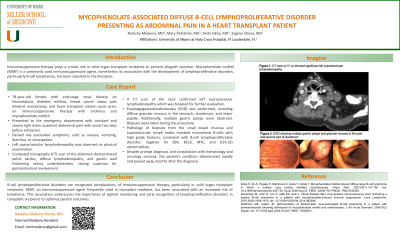Monday Poster Session
Category: Stomach
P3358 - Mycophenolate-Associated Diffuse B-Cell Lymphoproliferative Disorder Presenting as Abdominal Pain in a Heart Transplant Patient
Monday, October 28, 2024
10:30 AM - 4:00 PM ET
Location: Exhibit Hall E

Has Audio
.jpg)
Natasha Mederos, MD
University of Miami Miller School of Medicine at Holy Cross Hospital, FL
Presenting Author(s)
Natasha Mederos, MD1, Mary Parianos, MD1, Anita Sikha, MD1, Evgeny Idrosov, MD2
1University of Miami Miller School of Medicine at Holy Cross Hospital, Fort Lauderdale, FL; 2Holy Cross Hospital, Plantation, FL
Introduction: Immunosuppressive therapy plays a critical role in solid organ transplant recipients to prevent allograft rejection. Mycophenolate mofetil (MMF) is a commonly used immunosuppressive agent, nonetheless its association with the development of lymphoproliferative disorders, particularly B-cell lymphomas, has been reported in the literature.
Case Description/Methods: A 78-year-old female with a past medical history of end-stage renal disease on hemodialysis, diabetes mellitus, breast cancer status post bilateral mastectomy, and heart transplant sixteen years prior, on immunosuppressive therapy with sirolimus and mycophenolate mofetil, presented to the emergency department with constant and severe right lower quadrant abdominal pain with onset two days before admission. The patient denied any associated symptoms, such as nausea, vomiting, diarrhea, or constipation. The patient was hemodynamically stable, and left supraclavicular lymphadenopathy was observed on physical examination. A computed tomography (CT) scan of the abdomen demonstrated pelvic ascites, diffuse lymphadenopathy, and gastric wall thickening versus underdistention, raising suspicion for gastrointestinal involvement. A CT scan of the neck [Figure 1] confirmed left supraclavicular lymphadenopathy. Esophagogastroduodenoscopy (EGD) [Figure 2] was performed, revealing diffuse granular mucosa in the stomach, duodenum, and major papilla. Additionally, multiple gastric polyps were observed. Biopsies were taken during the procedure. Supraclavicular lymphadenopathy was also biopsied for further evaluation. Pathology of biopsies from the small bowel mucosa and supraclavicular lymph nodes revealed monoclonal B-cells with high grade features, consistent with B-cell lymphoproliferative disorder; negative for EBV, BCL6, MYC, and t(14;18) abnormalities. Despite prompt diagnosis and consultation with hematology and oncology services, the patient's condition deteriorated rapidly. Unfortunately, the patient passed away months after the diagnosis.
Discussion: B-cell lymphoproliferative disorders are recognized complications of immunosuppressive therapy, particularly in solid organ transplant recipients. MMF, an immunosuppressive agent frequently used in transplant medicine, has been associated with an increased risk of lymphoma. This association underscores the importance of vigilant monitoring and early recognition of lymphoproliferative disorders in transplant recipients to optimize patient outcomes.

Disclosures:
Natasha Mederos, MD1, Mary Parianos, MD1, Anita Sikha, MD1, Evgeny Idrosov, MD2. P3358 - Mycophenolate-Associated Diffuse B-Cell Lymphoproliferative Disorder Presenting as Abdominal Pain in a Heart Transplant Patient, ACG 2024 Annual Scientific Meeting Abstracts. Philadelphia, PA: American College of Gastroenterology.
1University of Miami Miller School of Medicine at Holy Cross Hospital, Fort Lauderdale, FL; 2Holy Cross Hospital, Plantation, FL
Introduction: Immunosuppressive therapy plays a critical role in solid organ transplant recipients to prevent allograft rejection. Mycophenolate mofetil (MMF) is a commonly used immunosuppressive agent, nonetheless its association with the development of lymphoproliferative disorders, particularly B-cell lymphomas, has been reported in the literature.
Case Description/Methods: A 78-year-old female with a past medical history of end-stage renal disease on hemodialysis, diabetes mellitus, breast cancer status post bilateral mastectomy, and heart transplant sixteen years prior, on immunosuppressive therapy with sirolimus and mycophenolate mofetil, presented to the emergency department with constant and severe right lower quadrant abdominal pain with onset two days before admission. The patient denied any associated symptoms, such as nausea, vomiting, diarrhea, or constipation. The patient was hemodynamically stable, and left supraclavicular lymphadenopathy was observed on physical examination. A computed tomography (CT) scan of the abdomen demonstrated pelvic ascites, diffuse lymphadenopathy, and gastric wall thickening versus underdistention, raising suspicion for gastrointestinal involvement. A CT scan of the neck [Figure 1] confirmed left supraclavicular lymphadenopathy. Esophagogastroduodenoscopy (EGD) [Figure 2] was performed, revealing diffuse granular mucosa in the stomach, duodenum, and major papilla. Additionally, multiple gastric polyps were observed. Biopsies were taken during the procedure. Supraclavicular lymphadenopathy was also biopsied for further evaluation. Pathology of biopsies from the small bowel mucosa and supraclavicular lymph nodes revealed monoclonal B-cells with high grade features, consistent with B-cell lymphoproliferative disorder; negative for EBV, BCL6, MYC, and t(14;18) abnormalities. Despite prompt diagnosis and consultation with hematology and oncology services, the patient's condition deteriorated rapidly. Unfortunately, the patient passed away months after the diagnosis.
Discussion: B-cell lymphoproliferative disorders are recognized complications of immunosuppressive therapy, particularly in solid organ transplant recipients. MMF, an immunosuppressive agent frequently used in transplant medicine, has been associated with an increased risk of lymphoma. This association underscores the importance of vigilant monitoring and early recognition of lymphoproliferative disorders in transplant recipients to optimize patient outcomes.

Figure: Figure 1. CT neck w/ IV co showed significant left supraclavicular lymphadenopathy. The largest lymph nodes measured 2.6 x 2.7 x 2.7 cm, 2.7 x 2.1 x 2.0 cm, and 1.7 x 1.7 x 1.8 cm in size.
Figure 2. EGD showed multiple gastric polyps and granular mucosa in first part and second part of duodenum.
Figure 2. EGD showed multiple gastric polyps and granular mucosa in first part and second part of duodenum.
Disclosures:
Natasha Mederos indicated no relevant financial relationships.
Mary Parianos indicated no relevant financial relationships.
Anita Sikha indicated no relevant financial relationships.
Evgeny Idrosov indicated no relevant financial relationships.
Natasha Mederos, MD1, Mary Parianos, MD1, Anita Sikha, MD1, Evgeny Idrosov, MD2. P3358 - Mycophenolate-Associated Diffuse B-Cell Lymphoproliferative Disorder Presenting as Abdominal Pain in a Heart Transplant Patient, ACG 2024 Annual Scientific Meeting Abstracts. Philadelphia, PA: American College of Gastroenterology.
